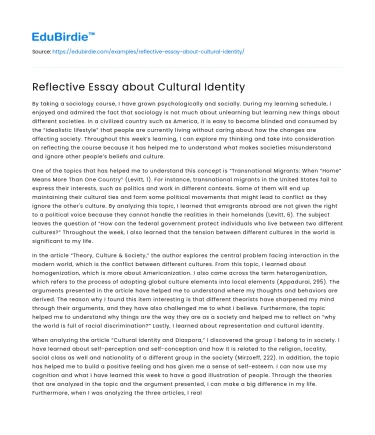By taking a sociology course, I have grown psychologically and socially. During my learning schedule, I enjoyed and admired the fact that sociology is not much about unlearning but learning new things about different societies. In a civilized country such as America, it is easy to become blinded and consumed by the “idealistic lifestyle” that people are currently living without caring about how the changes are affecting society. Throughout this week’s learning, I can explore my thinking and take into consideration on reflecting the course because it has helped me to understand what makes societies misunderstand and ignore other people’s beliefs and culture.
One of the topics that has helped me to understand this concept is “Transnational Migrants: When “Home” Means More Than One Country” (Levitt, 1). For instance, transnational migrants in the United States fail to express their interests, such as politics and work in different contexts. Some of them will end up maintaining their cultural ties and form some political movements that might lead to conflict as they ignore the other's culture. By analyzing this topic, I learned that emigrants abroad are not given the right to a political voice because they cannot handle the realities in their homelands (Levitt, 6). The subject leaves the question of “How can the federal government protect individuals who live between two different cultures?” Throughout the week, I also learned that the tension between different cultures in the world is significant to my life.
Save your time!
We can take care of your essay
- Proper editing and formatting
- Free revision, title page, and bibliography
- Flexible prices and money-back guarantee
In the article “Theory, Culture & Society,” the author explores the central problem facing interaction in the modern world, which is the conflict between different cultures. From this topic, I learned about homogenization, which is more about Americanization. I also came across the term heterogenization, which refers to the process of adopting global culture elements into local elements (Appadurai, 295). The arguments presented in the article have helped me to understand where my thoughts and behaviors are derived. The reason why I found this item interesting is that different theorists have sharpened my mind through their arguments, and they have also challenged me to what I believe. Furthermore, the topic helped me to understand why things are the way they are as a society and helped me to reflect on “why the world is full of racial discrimination?” Lastly, I learned about representation and cultural identity.
When analyzing the article “Cultural Identity and Diaspora,” I discovered the group I belong to in society. I have learned about self-perception and self-conception and how it is related to the religion, locality, social class as well and nationality of a different group in the society (Mirzoeff, 222). In addition, the topic has helped me to build a positive feeling and has given me a sense of self-esteem. I can now use my cognition and what I have learned this week to have a good illustration of people. Through the theories that are analyzed in the topic and the argument presented, I can make a big difference in my life. Furthermore, when I was analyzing the three articles, I realized that what we learn in sociology helps us to learn about other people’s cultures and understand them so that we can better our lives. Finally, I appreciate the work of my instructor and the authors of these articles for their dedication to sharing their cognition with the world to make it better.
Works Cited
- Appadurai, Arjun. 'Disjuncture and Difference in the Global Cultural Economy.' Theory, Culture & Society, vol. 7, no. 2-3, 23 Apr. 2010, pp. 295-310.
- Levitt, Peggy. 'Transnational Migrants: When “Home” Means More Than One Country.' Migration Policy Institute Online Journal, 1 Oct. 2004, pp. 1-10, www.migrationpolicy.org/print/4728#.XTcR6_ZuIRZ. Accessed 23 July 2019.
- Mirzoeff, Nicholas. 'Cultural identity and diaspora.' Diaspora and Visual Culture: Representing Africans and Jews, 1st ed., Psychology P, 2000, pp. 222-237.






 Stuck on your essay?
Stuck on your essay?

